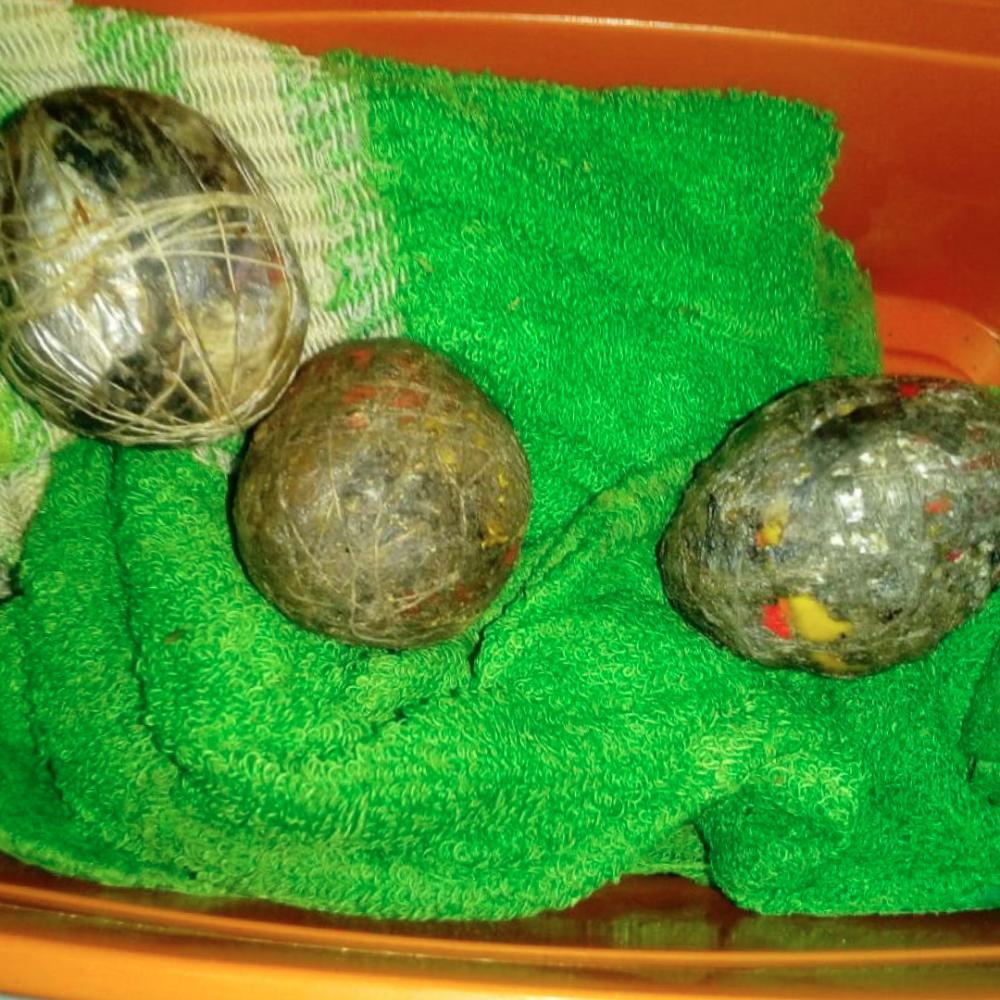KOTA KINABALU: Poachers have taken it to land and creatively serve up deadly rounds of “bom babi” to catch their next meal, according to WWF-Malaysia.
A straightforward and fitting name, the primary targets to these homemade explosives are the bearded pigs, locally known as babi hutan.
WWF-Malaysia pointed out in a statement yesterday that these small but deadly homemade explosives are essentially the size of ping pong balls concealing a low explosive mixture of explosive material in adhesive tape. The bombs are set down by hunters in hopes that the dead pigs would bring food to the table by sale of the game meat ‘sinalau bakas’, or for personal consumption.
These seemingly average-looking balls could come in bright colours to tickle the fancy of unsuspecting creatures who would die in the attempt to devour the bomb baited with fat. The bombs are detonated by way of pressure, usually when bitten or stepped on, and could become a greater threat than initially thought.
In 2014, a boar with its snout blown off was found dead within the Kinabatangan Wildlife Sanctuary. The explosives laden in belacan were planted along the forest corridor adjacent to an oil palm plantation. This is an illegal act as the animals are protected in the sanctuary under the Sabah Wildlife Enactment 1997, and an act undoubtedly inhumane as no life should ever be lost in such a barbaric way.
To poachers, this method would seem logically efficient considering a zero-contact with the prey that almost guarantees a kill, unlike snares which gives them a fighting chance to escape alive. However, this is still an inhumane and barbaric act. Planting explosives is never a good idea as it sparks the fear of accidental detonation by stepping on them – a mistake even poachers themselves can make.
It endangers both animal and human lives as well as public and private property like vehicles and land. A circulated Facebook post on the issue showed that dogs, cars, and people in Sungai Asap, Sarawak, have become victims of the makeshift explosive, according to the World of Buzz in June 2019.
WWF-Malaysia fears that larger animals like the endangered Bornean elephant, could fall prey to these tiny triggers of tragedy. The weight of an elephant’s step, so great that both sound and motion reverberate, could set off the bombs by accident. In the wrong hands, these bombs are capable of lethal effect beyond innocent subsistence living. Take the tragedy of fish bombs, for example, where two tourists and a local guide were killed by a blast while diving in the waters off Semporna this year.
These cruel swine killings are known practice only in Sabah and Sarawak. The homemade bombs have slipped under the radar for long enough. The “bom babi” has come to the attention of law enforcement and is now recognised as an explosive under the Explosives Act 1957 (Act 207). The charge, framed under Section 8 of the Explosives Act 1957 (Act 207), carries a maximum seven years’ jail or a fine of up to RM10,000 or both.
In 2019, police have seized 43 “bom babi” and other material used to make these explosives in a raid in Tawau.
According to WWF-Malaysia, at a glance these hazardous objects could be mistaken for playthings. The first and most important step upon making this discovery is to not move the suspected bomb and help cordon the area for your safety and those around you and call the nearest police station.
Most cases go unreported as there was little awareness on the matter – people don’t recognise the look and destructive power of the explosives, or who to report it to. This makes it difficult to monitor the activity that was so often hidden away from sight.
As nature’s watchdog, WWF-Malaysia said the best action is to report findings to the police, and the Sabah Wildlife Department upon finding a carcass or the Sabah Forestry Department on any incidents regarding unusual and unwarranted wildlife killings within a forest reserve.
“We could stop poachers in their tracks if we cooperate with the authorities in order for them to take swift and stern action on those who commit heinous wildlife crime. Some people may not realise the penalties for manufacturing and possessing these explosives, and the potential danger that follows with it. It is vital that action must be taken in its infancy before things take a turn for the worst,” added WWF-Malaysia. — Borneo Post













